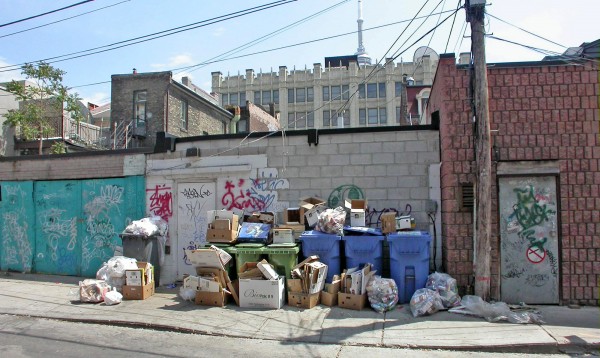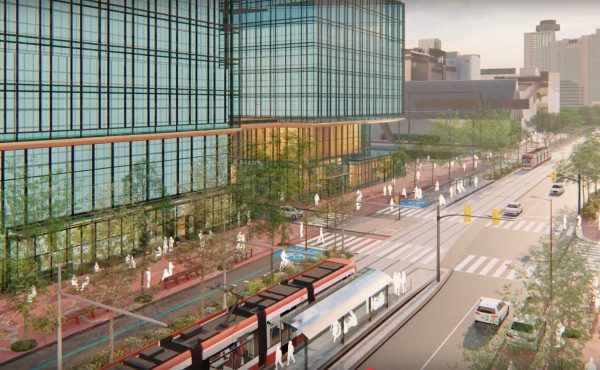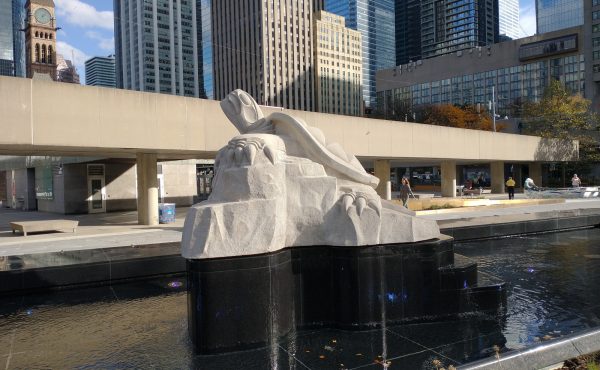It’s easy to forget, after the landslide of (political) crud unleashed by the brothers Ford, that our chief magistrate’s checkered mayoral career traces its beginnings to the 2009 garbage strike, and his strident pledge to outsource collection as a means of breaking the union. Ford exploited the public’s unhappiness about that lengthy job action, and, in what is really the most substantial achievement of his term, succeeded in privatizing collection west of Yonge Street, with the promise of more.
So it’s fascinating and ironic that in the dying days of Ford’s term, the winning contractor – a well capitalized and extremely territorial outfit called Green For Life Environmental, which won the multi-year contract with a low-ball bid – is doing its best to show that privatization, in practice, is hardly the panacea that Ford et al promised.
At public works committee tomorrow, staff will table quarterly complaints figures showing that GFL’s operations in District 1 (Etobicoke/York) have the poorest record as measured by service requests per thousand pass-bys of all four regions across the city (GFL has the balance of the west of Yonge section, known as District 2; CUPE Local 416 still has districts 3 and 4, east of Yonge). By contrast, the CUPE crews that work Scarborough last quarter registered the fewest complaints.
The District 1 contract — which has been in place since 2007, held first by Turtle Island and then GFL — was frequently held up as an example of how the private sector gives better service. Despite the rhetoric, it has been performing increasingly poorly in the past two years, as this works department chart indicates [PDF].
Indeed, as works staff explained to an administrative inquiry by Councillor Mike Layton, the city has decided not to extend GFL’s contract when it expires in 2015, and instead re-tender the deal in part because of increasing complaints.
The spotty track record is merely the latest, um, strike against GFL: before the company won the City deal, its waste management group had run into trouble in other jurisdictions, including Hamilton and Kawartha Lakes, while the company’s clean fill/excavation division has attracted complaints and regulatory reprimands east of the GTA.
This past winter, municipal politicians in six northern York Region municipalities took GFL to task after its trucks failed to collect the garbage during a bad-weather run in December. As one Whitchurch-Stoufville councillor told a YorkRegion.com reporter: “It was really disturbing the lack of communication between the staff at GFL, they basically unplugged their phone lines and left our staff and residents out to dry.” GFL CEO Patrick Dovigi had to appear at one council meeting to show his contrition.
Toronto hasn’t run into those sorts of problems. But I’ve wondered in recent years whether the complaints metrics, which helped scotch the District 1 contract, provide an accurate performance gauge, or if it merely disguises other practices.
Residents complain mainly for two reasons: one, the collection is late; two, that their garbage wasn’t removed (the myth of the surly city worker is just that). My own non-scientific observation in my (west-of-Yonge) neighbourhood is that homeowners increasingly put out more and more stuff on garbage day, secure in the knowledge that the GFL trucks will haul off all the excess trash, with or without a bag tag (in the interests of full disclosure, mea culpa).
Works officials claim they monitor the private contractors for compliance with the city’s garbage/diversion policies. But if I’m a GFL supervisor and I want to keep my service request numbers down (and my bonus up), I’d certainly tell my crews to pick up everything; they have all sorts of specific financial incentives to disregard the bag-tag rules, and none to observe them. (Likewise, homeowners.)
Even potentially more problematic for GFL is a recent Ontario superior court decision that dismissed an attempt by the company to quash a vehicle safety downgrade by the Ontario Registrar of Motor Vehicles (ORMV).
Last year, according to the judgment, GFL’s vehicle safety violation rate nosed above the 70% rate, meriting a downgrading of the ORMV rating from “satisfactory” to “conditional.” As the ruling points out, “the vast majority of Ontario’s nearly 55,000 [commercial vehicle operator registration (CVOR) certificate] holders have overall violation rates of 70% or less. 95.6% of holders have safety ratings equal to or below 35%. Only 0.6% of operators have an overall violation rate of over 70%.” Which is to say, GFL was in pretty shabby company.
Instead of complying with a public safety regulator, the firm tried to get that order set aside. Why? Because, as the city’s contract with GFL states, “The loss by the Contractor of its certification renders the Contractor unable to perform the work under this Contract and shall constitute default under the Contract. The City of Toronto may terminate the Contract and find a replacement contractor.”
That GFL took to the courts to reverse the ORMV’s order hints at its sense of desperation; after all, losing Canada’s largest municipal waste management contract because of unsafe trucks – translation: accidents with other vehicles or pedestrians, and all the associated scandal and litigation – would be nothing less than a reputational disaster for an acquisitive company on such a steep growth trajectory.
Council last week asked deputy city manager John Livey to explain to the works committee tomorrow what’s being done about the safety downgrade.
City officials, no less than Ford and the other council conservatives who pushed for the privatization, are heavily invested in the success of the out-sourced garbage collection project. So I’m not expecting Livey to tell the committee that the city should punt GFL, even though it could do just that (as the contract stipulates, the city “may” terminate, not “shall” terminate).
Yet no one can hide from the seriousness of this turn of events: after all the rhetoric about the private sector and service quality, the fact is that GFL, a flesh-and-blood company, hasn’t had the good sense to adhere to the terms of its agreement, either because of poor management or outright greed.
Homeowners, of course, aren’t going to get exercised about any of this stuff: the problems with the GFL contract are infinitely more subtle – for now, anyway – than blunt force of a strike, and all the attendant inconvenience. Still, what Toronto taxpayers should understand, the next time the privatization salesmen come a callin’, is that these deals are invariably tidier on paper than they are in reality.
photo by Kevin Steele






7 comments
The city union has demonstrated time and again that given a stranglehold, they’re eager to use it. Going back to that would be a terrible idea. But private contractors have a different set of problems to manage, and bad behavior should be expected. It’s not surprising that GFL has these issues, given their low ball bid. It seems to me that this is an excellent argument for having multiple contractors and maintaining some public capacity as well. Everyone should be worried about losing their contracts when the come up. The absolute lowest cost shouldn’t be the overriding concern.
Yes, piratization can have downsides, though at times it seems like the guys doing the work with GFL are working hard in all types of weather conditions.
With the truck safety issue, please also include cyclists – I can’t remember if the young woman who was nearly killed at Gerrard and Yonge awhile back – where there’s a bike lane though markings are bad – if that was a GFL truck or not. At other times, and sad tragedies, Robin Brown I think the name was quite awhile ago, there’s really minimal, minimal penalty involved in removing a cyclist from life, even when the truck is going the wrong way.
Hamish — you’re absolutely correct re: bikes, and thanks for pointing out that over-sight. JL
I wonder what the complaint figures would be if 311 actually opened service requests every time garbage is missed. (Typically when it’s a special collection, Christmas tree, first week of yard waste, the first week the collection is skipped, and it is only picked up on the second).
A call to 311 to give them a heads up results in them saying the contractor is late, and to take it in, and put it out for the following collection date – how many other calls like this are dismissed? (and why are the 311 ops covering for the contractor?)
I live in South Etobicoke, the first region to be privatized. Under Turtle Island we had few complaints however GSL is a total disaster. On recycling day they leave a trail of broken glass as their trucks leak like sieves. It is common to not see trash picked up until 7-8pm and on occasion not until the next day.
Herein lies a weakness in privatization, who do we hold to account? GSL doesn’t give a damn and the city sloughs complaints off to GSL.
My biggest concern about GFL has risen not out of service issues–the city workers used to routinely leave our west Toronto street festooned with rubbish that fell out of bins they flung back at the sidewalk after emptying–but what seems to be a lack of accountability over safety. When a GFL truck drove up onto the sidewalk on our street and ran over a bicycle & almost hit a mother and two children, who were shaken but uninjured, the driver and worker refused to provide their names to neighbours who clustered around after the incident. This continues to concern me, because I believe unionized city workers would have a protocol in place, whereas private garbage collectors appear to be primarily concerned with avoiding incriminating paperwork.
I think this is issue is still too political to get an honest evaluation of it’s success or failure. Both sides of the issue seem to want to point out the other side is failing.
When Toronto Life wrote that private collection was working last month. The Grid countered with their own and said it wasn’t working.
The metrics of measuring success or failure seem vague and hard to understand…. 1 service request per a thousand pass byes in district 1 vs 0.34 service request per thousand pass byes in district 3. The numbers seem insignificant or counting angels on a pin head. Or maybe it’s a huge amount because I’m not sure how to read the chart.
There’s also a lot of anecdotal evidence on both sides of, “I once saw a garbage truck do this…and I was outraged!”
I don’t think we will know how to evaluate private vs public garbage removal until their is another garbage crisis, a wage scandal or a massive equipment failure…. or god forbid another summer strike.